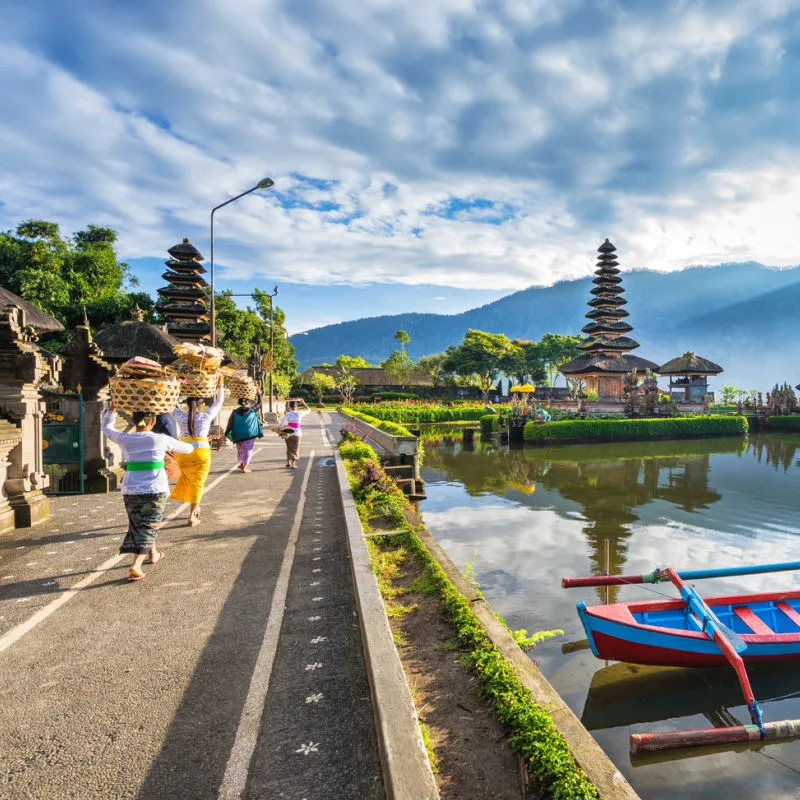Following kickbacks from plans announced to develop a Halal tourism certification program in Bali, the new Deputy Minister for Tourism, Ni Luh Puspa, has confirmed that the plan has been scrapped.
The Deputy Tourism Minister has confirmed that tourism development initiatives will be implemented in accordance with Balinese culture and cultural heritage.

Deputy Tourism Minster Ni Luh Puspa has issued statements apologizing for the confusion and commotion regarding plans to develop Halal tourism across Indonesia.
Since Bali is a majority Balinese Hindu province, many local tourism leaders and local communities felt that mandatory implementation of Halal certification for tourism businesses across the province was inappropriate and not in alignment with Balinese culture.
In a statement issued on Instagram, Puspa explained, “It is only right that local wisdom and Balinese cultural richness must be maintained together to be an attraction for tourists. Building Bali into a sustainable and inclusive shared home for all groups.”
She noted that Bali will remain Indonesia’s leading tourist destination, and it is loved for its culture, natural beauty, and friendly people.
She noted that although she wants to support President Prabowo Subiatnos Asta Cita’s development initiative, doing so must be in alignment with advancing the quality and sustainability of Indonesian tourism while also honoring and promoting the welfare of local people.
Puspa added, “Regarding the issue that is currently happening, I apologize to those who are not happy with it, and I will use it as motivation to work even harder for this nation and state.”
She expressed her gratitude to those who expressed concern and criticism and called on all parties to continue to work together.
She concluded on the matter, “I have explained that currently, we are still focused on organizational structuring, evaluating work programs that have been implemented in the previous period, and finalizing future work programs to be in line with the RPJMN and the direction of the President and Vice President.”
Moving forward, Deputy Tourism Minister Ni Luh Puspa and Tourism Minister, Widiyanti Putri Wardhana, will start by focusing on quick wins.
She noted, “Specifically for Bali, the ministry and I are committed to culture-based tourism that continues to be developed because that is the strength of Bali.”
President Subitanto has been praised for ensuring that a Balinese senator was assigned a high position in both the cabinet and the Ministry of Tourism.

Speaking separately on the matter of a mandatory Halal tourism certification, the Chairman of the Bali Tourism Board (BTB), Ida Bagus Agung Partha Adnyana, said, “Bali already has a strong image as a destination with high cultural diversity and tolerance, so it is important for us to maintain a balance between innovation in tourism services and respect for local values.”
He called for any future promotion of Halal tourism in Bali to be established with a great deal of care.
He added that “In the context of Bali, the approach needs to be done carefully, ensuring that the development of these halal facilities respects local culture and does not change the identity of Bali, which is already known to the world.”

Adnyana said that there is space for Halal tourism in Bali but that such programs should be developed alongside tourism that promotes traditional Balinese culture, and not at its expense.
He added, “In essence, the balance between halal tourism innovation and Balinese cultural preservation is very important so that all parties feel appreciated and Bali’s diversity is maintained as its main attraction.”

For many leaders and communities in Bali, it is clear that the central tenant of tourism development should remain Tri Hita Karana. The Balinese philosophy of Tri Hita Karana is the core belief that promotes harmony between people, the natural works, and the spiritual realms.
In Balinese culture, all decisions and actions are made with Tri Hita Karana at heart, and as such, Tri Hita Karana is seen as the method for creating tourism developments.
Halal, the Islamic practice of observing objects and activities as ‘permissible’ as opposed to Haram, which is ‘forbidden’, is often considered to be as incompatible with aspects of Balinese Hindu philosophy.
Remove All Ads & Unlock All Articles… Sign up for The Bali Sun Premium

Plan Your Bali Holiday:
Book The Best English Speaking Drivers For Airport Transfers & Tours
Choose From Thousands of Bali Hotels, Resorts, and Hostels with Free Cancellation On Most Properties
Book Cheap Flights To Bali
Don’t Forget Travel Insurance That Covers Medical Expenses In Bali
For the latest Bali News & Debate Join our Facebook Community
SUBSCRIBE TO NEW POSTS
Enter your email address to subscribe to The Bali Sun’s latest breaking news, straight to your inbox.
Discover more from The Bali Sun
Subscribe to get the latest posts sent to your email.

Randy
Wednesday 13th of November 2024
Halal or not halal does not matter. What matters it’s mutual respect among people and each person’s dietary consumption. If you do not eat pork then there are plenty of halaL restaurants in Bali and if you eat pork there are all over Bali. It’s a matter of choice. Therefore if you visit a country or a region regardless of your religious beliefs, respect the local customs you are visiting and not the other way around to suit your own religious belief. And by the way, there are 29.1 Million of Christians in Indonesia vs Australia with 1.1 Million as of 2024 statistics. Bhinneka Tunggal Ika meant for something which Literally means Unit in Diversity.
Paul
Tuesday 5th of November 2024
GOOD
WAYAN BO
Tuesday 5th of November 2024
🇮🇱KOSHER TOURISM🇮🇱